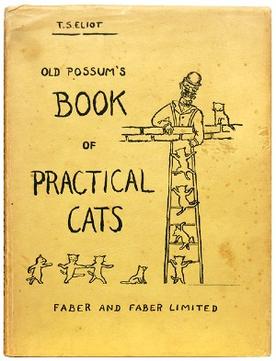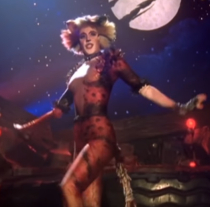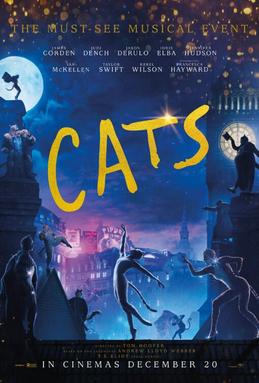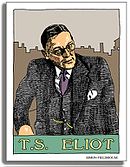
Old Possum's Book of Practical Cats (1939) is a collection of whimsical light poems by T. S. Eliot about feline psychology and sociology, published by Faber and Faber. It serves as the basis for Andrew Lloyd Webber's 1981 musical Cats.

Cats is a sung-through musical with music by Andrew Lloyd Webber. It is based on the 1939 poetry collection Old Possum's Book of Practical Cats by T. S. Eliot. The musical tells the story of a tribe of cats called the Jellicles and the night they make the "Jellicle choice" by deciding which cat will ascend to the Heaviside Layer and come back to a new life. As of 2024, Cats remains the fifth-longest-running Broadway show and the eighth-longest-running West End show.
Electra, also spelt Elektra, was a daughter of Agamemnon and Clytemnestra in Greek mythology.
Rum Tum Tugger is one of the many feline characters in the 1939 poetry book Old Possum's Book of Practical Cats by T. S. Eliot, and in the 1981 musical Cats which is based on Eliot's book. Rum Tum Tugger is a rebellious Jellicle cat who loves to be the center of attention.

Grizabella the Glamour Cat is a main character in the Andrew Lloyd Webber musical Cats. Lonely and decrepit, Grizabella seeks acceptance from the other Jellicle cats but is initially ostracised. She sings the most famous song from the musical, "Memory".
Mr. Mistoffelees is a character in T. S. Eliot's 1939 poetry book Old Possum's Book of Practical Cats and its 1981 musical adaptation, Andrew Lloyd Webber's Cats. Mistoffelees is a young black-and-white tuxedo cat with magical powers that he cannot yet fully control. He is a featured dancer and his signature move is the "Conjuring Turn", consisting of 24 consecutive fouettés en tournant. His chorus identity is sometimes named Quaxo.

Mungojerrie and Rumpleteazer are fictional characters in T. S. Eliot's 1939 poetry book Old Possum's Book of Practical Cats. The Jellicle cat duo are mischievous petty thieves who often cause trouble for their human family. Although originally published as part of a collection, the poem "Mungojerrie and Rumpleteazer" was published as a standalone book by Faber and Faber in 2018.

Munkustrap is a Jellicle cat from T. S. Eliot's 1939 poem "The Naming of Cats". He is a principal character and the main narrator in Andrew Lloyd Webber's 1981 musical Cats, which is based on Eliot's poems.
Jennyanydots is a fictional character from T. S. Eliot's 1939 poetry book Old Possum's Book of Practical Cats. She is also a principal character in the 1981 Andrew Lloyd Webber musical Cats, which is based on Eliot's work. Jennyanydots is a seemingly lazy Jellicle cat who sits around all day, but at night, she becomes very active as she rules the mice and cockroaches, forcing them to undertake helpful functions and creative projects to curb their naturally destructive habits.

Cats is a 1998 British direct-to-video musical film based on the 1981 stage musical by Andrew Lloyd Webber, itself based on Old Possum's Book of Practical Cats (1939) by T. S. Eliot. Lloyd Webber oversaw orchestration and called on Gillian Lynne, the show's original choreographer, to train the cast members. David Mallet served as the director of this production.

Growltiger is a fictional character appearing in both T. S. Eliot's Old Possum's Book of Practical Cats and Andrew Lloyd Webber's musical Cats which is based on Eliot's book. He is described as a "bravo cat who lived upon a barge", one who scoured the Thames from Gravesend to Oxford, terrorizing the inhabitants along the river, including "cottagers", canaries, geese, hens, "pampered Pekinese", and the "bristly Bandicoot that lurks on foreign ships". Growltiger is usually envisioned as a pirate, although he is never explicitly described as such. He has lost one eye, and one of his ears is "somewhat missing" after an incident involving a Siamese cat.

The Great Rumpus Cat is a fictional character from T.S. Eliot's 1939 book Old Possum's Book of Practical Cats and in Andrew Lloyd Webber's 1981 musical, Cats.
"(Of) The Awefull Battle of the Pekes and the Pollicles" is a poem by T. S. Eliot included in Old Possum's Book of Practical Cats, his 1939 book of light verse. It is also included in Andrew Lloyd Webber's 1981 musical Cats, which is an adaptation of the book.

Jellylorum is a principal character in the musical Cats. One of the Jellicle cats, she is usually portrayed as a motherly caretaker and is principally a vocalist. The musical is based on the 1939 collection of poems by T. S. Eliot from Old Possum's Book of Practical Cats, and Jellylorum is named after the poet's own cat.
"Gus: The Theatre Cat" is a poem by T. S. Eliot included in Old Possum's Book of Practical Cats. Known as "The Theatre Cat" due to his career as an actor, Gus is an old and frail, yet revered, cat, who "suffers from palsy, which makes his paws shake." His coat is described as "shabby" and he is "no longer a terror to mice or to rats."

Demeter is a main character in the Andrew Lloyd Webber musical Cats. The musical is an adaptation of T. S. Eliot's 1939 poetry book Old Possum's Book of Practical Cats, and the character's name is given in the poem "The Naming of Cats". Demeter is a very troubled and skittish female Jellicle cat. The role was originated by Sharon Lee-Hill in the West End in 1981, and by Wendy Edmead on Broadway in 1982. Daniela Norman played this role in the 2019 film adaptation.

Bombalurina is a principal character in the Andrew Lloyd Webber musical Cats. The musical is an adaptation of T. S. Eliot's 1939 poetry book Old Possum's Book of Practical Cats, and the character's name is given in the poem "The Naming of Cats". Bombalurina is a flirtatious, confident female and mischievous cat with a distinct red coat. The role was originated by Geraldine Gardner in the West End in 1981, and by Donna King on Broadway in 1982. In the 2019 film adaptation, she is played by Taylor Swift.

Macavity the Mystery Cat, also called the Hidden Paw, is a fictional character and the main antagonist of T. S. Eliot's 1939 poetry book Old Possum's Book of Practical Cats. He also appears in the Andrew Lloyd Webber 1981 musical Cats, which is based on Eliot's book. Macavity is a cunning criminal and con artist; he possesses mystical powers and is the antagonist of the musical.
Jellicle cats are a fictional type of feline from Old Possum's Book of Practical Cats, a 1939 collection of light poetry by T. S. Eliot. Jellicle cats were adapted for the 1981 stage musical Cats by Andrew Lloyd Webber, where the wide array of diverse Jellicles is central to the musical's worldbuilding.

Cats is a 2019 musical fantasy film based on the 1981 West End musical Cats by Andrew Lloyd Webber, which in turn was based on the 1939 poetry collection Old Possum's Book of Practical Cats by T. S. Eliot. The film was directed by Tom Hooper, in his second feature musical following Les Misérables (2012), from a screenplay by Lee Hall and Hooper. It features an ensemble cast, including James Corden, Judi Dench, Jason Derulo, Idris Elba, Jennifer Hudson, Ian McKellen, Taylor Swift, Rebel Wilson and Francesca Hayward. The film marked the feature film debut for both Derulo and Hayward.













